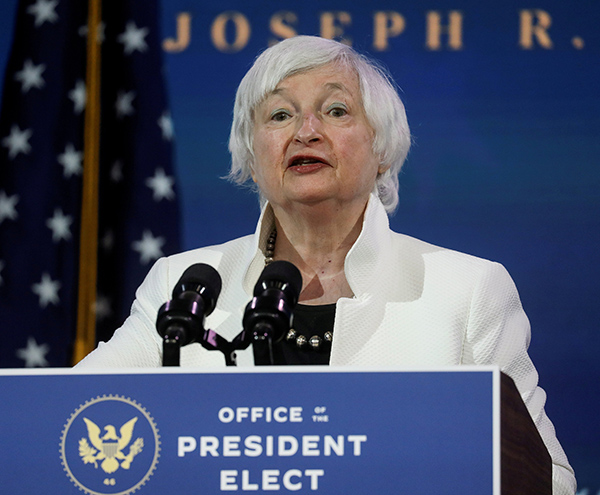
NEW YORK — For the first time in at least 30 years, on March 16 interfaith leaders — including two Catholic bishops — got a seat at the table to discuss global issues with the head of the U.S. Department of the Treasury.
The religious leaders met with U.S. Treasury Secretary Janet Yellen to discuss the global economic response to the COVID-19 pandemic, Puerto Rico’s debt and climate change. It was organized by Jubilee USA Network; a coalition of religious, development and advocacy groups that focuses on policies that help end poverty.
Eric LeCompte, executive director of Jubilee USA Network called the meeting “historic.”
“It was important because since Yellen began she’s only been meeting with presidents, finance ministers, governors, mayors and heads of Fortune 500 companies, so to meet with these leaders of American life dealing with these issues was incredibly important,” LeCompte told The Tablet.
LeCompte further noted that the timing was significant since the next round of decisions on most of the issues discussed will be made next month by the G-20 and International Monetary Fund. And subsequently another round of decisions this summer when the G-20 meets, and the fall when the IMF meets again.
“We’re essentially in a continuing wave of decisions that are going to take place,” he said.
The two Catholic prelates participating were Bishop David Malloy of Rockford, chairman of the USCCB’s Committee on International Justice and Peace, and Archbishop Roberto González Nieves of San Juan, Puerto Rico.
They were joined by leaders from the Lutheran, Presbyterian, Methodist, United Church of Christ Churches, Union for Reform Judaism and Puerto Rico’s Evangelical Bible Society.
Bishop Malloy gave a presentation on the need for developing countries to access emergency reserve funds, called special drawing rights (SDR), which is a currency generated by the IMF. The currency was last generated after the 2008-2009 financial crisis.
LeCompte said Tuesday’s meeting was “critical” to move forward the recreation of the funds. He and Malloy previously called on the administration of President Joe Biden to lead these efforts — with the G-20, IMF and Congress — in a joint letter to Biden and Yellen in February.
Economic relief for the poorest countries in the world through debt payment suspension was another focus of the meeting. According to LeCompte, the 73 poorest countries in the world have qualified for the Debt Service Suspension Initiative — 40 of which have taken advantage of it for about $12 billion in relief.
“It allows these countries to move the monies they’re now paying on debt into healthcare, social programs and some stimulus for their people to try and get on the other side of this crisis,” LeCompte said.
A readout from the U.S. Department of Treasury after the meeting said Yellen supports “the implementation of the Debt Service Suspension Initiative (DDSI).” And she views potential SDR allocation “as part of a broader package of assistance to low-income countries.”
The readout closed that the Biden administration is “committed to using the full power of the U.S. federal government to address climate change as part of the Build Back Better plan.”
In an email to The Tablet, Archbishop González said he hopes that “the secretary would bring our concerns regarding Puerto Rico to the attention of the president for his action, as well as to Biden’s Cabinet and to the Congress.”
Archbishop González further outlined the specific concerns he had, including the “current debt restructuring does not cut sufficient debt,” noting that approximately 60 percent of children in Puerto Rico are trapped in poverty.
He is also concerned that the $4 billion in disaster relief and social aid following hurricanes and Irma and Maria, the earthquakes and the pandemic, will not be used properly.
“We are concerned about these monies going to creditors and paying debt. We are also concerned that the distribution of these funds be monitored adequately given the history of corruption in Puerto Rico,” said Archbishop González.
Finally, Archbishop González said they have asked Yellen to monitor the upwards of a million new filings to the Internal Revenue Service (IRS) now that the Earned Income Tax Credit and Child Tax Credit for Puerto Rico has moved forward.
The discussion was important, LeCompte said, because it’s the first time that Puerto Rico’s debt crisis “has risen to the level of treasury secretary and now it’s on that high agenda.”
The meeting as a whole, he added, was an important opportunity to invoke the teachings of Pope Francis, specifically on climate issues, financial crisis resolution tools, bankruptcy and being able to prevent the next crisis.
“It certainly says something very positive about [Yellen’s] approach and the approach the administration is taking right now to include the voices of faith traditions and prominent faith leaders,” LeCompte said.
